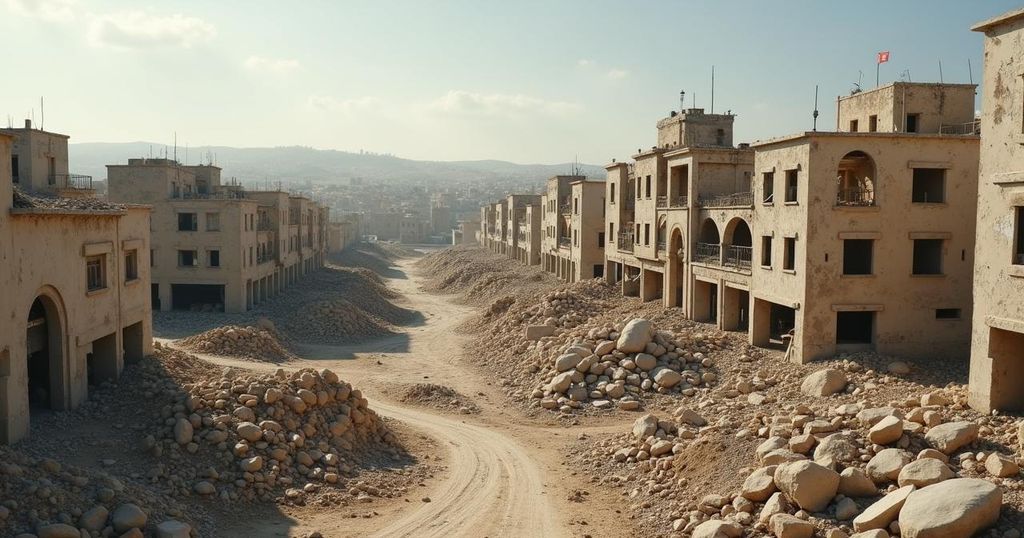Secretary of State Antony Blinken is evaluating a post-war plan for Gaza, developed with Israel and the UAE, with discussions aimed at presenting the plan post-election. However, concerns arise regarding the marginalization of Palestinian Authority President Mahmoud Abbas. Internal State Department debates underscore tensions surrounding the plan’s feasibility and implications for Palestinian governance.
Secretary of State Antony Blinken is deliberating the introduction of a post-war reconstruction plan for Gaza, developed in conjunction with Israel and the United Arab Emirates (UAE), which may be unveiled following the upcoming presidential election. This consideration arises amid concerns regarding the potential marginalization of Palestinian Authority President Mahmoud Abbas, a key figure whom Israel and the UAE wish to sideline in their immediate strategic objectives. With ongoing challenges related to hostages taken by Hamas and the absence of a ceasefire, presenting a proactive “day-after” plan could contribute positively to the Biden administration’s legacy in the region, contend U.S. officials. In discussions involving U.S., Israeli, Palestinian, and Emirati representatives, some officials have expressed skepticism about the feasibility of negotiating a hostage release and ceasefire prior to the election. Thus, the Israeli-Emirati proposal could serve as a viable alternative, although it has prompted some within the State Department to question its viability due to its perceived alignment with Israeli Prime Minister Benjamin Netanyahu’s agenda. The Biden administration’s dialogue with Israel and the UAE regarding this reconstruction plan has spanned several months. Notably, former British Prime Minister Tony Blair has contributed to the discussions, suggesting foundational concepts for the plan. A significant meeting took place in Abu Dhabi last summer, with key officials, including Brett McGurk and Tom Sullivan, engaging with Netanyahu’s confidant and the Emirati Foreign Minister to discuss various project components. A central feature of the Emirati proposal involves deploying an international mission to Gaza to administer humanitarian assistance, restore order, and establish governance frameworks. However, the Emiratis have conditioned this deployment on reforms within the Palestinian Authority, suggesting the replacement of Abbas and his loyalists to facilitate an effective governance transition. Further complications arise from friction between the Israeli and Emirati perspectives, particularly concerning the Palestinian Authority’s role in any governance restructuring. The Emiratis advocate for a greater involvement of the Palestinian leadership, which Israel opposes, along with any support for a two-state solution vision, a point of contention within the broader proposal discussions. As talks gain momentum, the Emiratis have introduced additional conditions, including the reopening of the U.S. consulate in Jerusalem as a gesture toward Palestinian engagement. Israeli officials have voiced strong opposition to this suggestion, complicating the negotiation landscape. Furthermore, internal debates within the State Department about the proposal’s direction indicate a contentious atmosphere, highlighting a divide between supporters of the Israeli-Emirati strategy and those advocating for a more inclusive approach that involves the Palestinian Authority. The Palestinian Authority has expressed skepticism regarding the Israeli-Emirati plan, emphasizing the potential for destabilization without a cohesive national strategy. Such hesitations reflect broader concerns that any marginalization of Palestinian leadership could jeopardize the integrity of the Palestinian national project.
The discussions surrounding a post-war plan for Gaza are situated within a context of ongoing conflict and shifting geopolitical alliances, particularly involving the United States, Israel, and the UAE. The current state of affairs is characterized by the absence of a ceasefire deal, as hostages remain held by Hamas, contributing to a sense of urgency for developing a functional governance strategy for Gaza’s future. The notion of implementing an international mission to aid in the region’s recovery has significant implications for the existing political landscape, including the role of the Palestinian Authority, which the Emiratis and Israelis appear to seek to redefine. The intricacies of these deliberations underscore the complex relationship dynamics at play, influencing not just territorial governance but also broader aspirations for lasting peace in the Israeli-Palestinian conflict.
In conclusion, the potential unveiling of a post-war plan for Gaza by Secretary of State Antony Blinken reflects a significant diplomatic effort to address the complexities of the ongoing conflict. With the involvement of Israel and the UAE, the proposed strategies bring forth critical discussions about the role of Palestinian leadership and the ultimate vision for governance in the region. Internal debates within the U.S. administration further highlight the contentious nature of these negotiations, illustrating the challenges of fostering stability in Gaza while balancing the interests of various stakeholders. The viability of such a plan remains uncertain, particularly given the existing tensions and geopolitical considerations at play.
Original Source: www.axios.com






